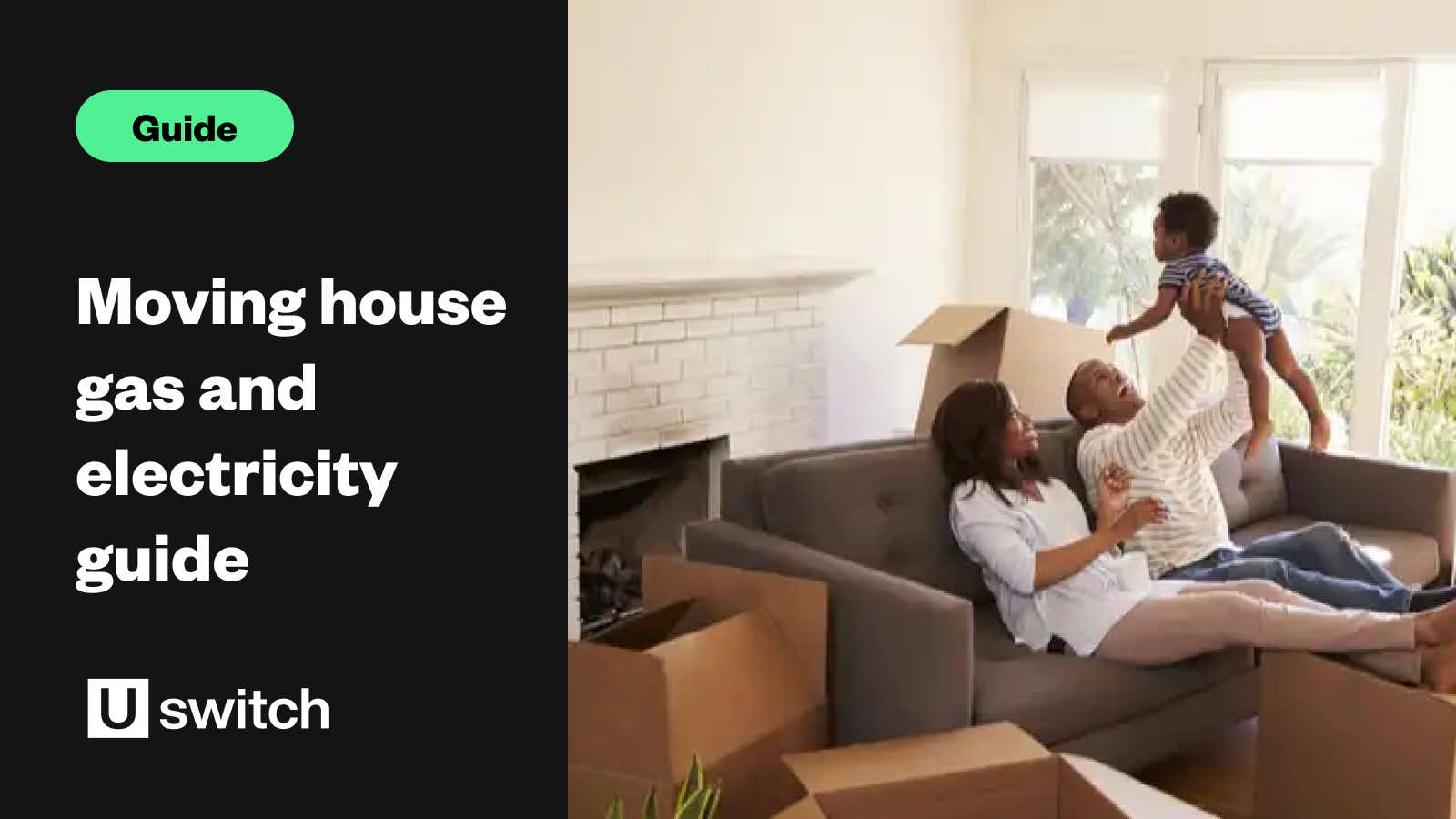Moving house gas and electricity checklist
It can be confusing trying to work out how to take over utilities when moving house. But remembering to notify your current energy supplier when moving house — and finding out who your new gas and electricity provider is — are important steps to ensure you don't overpay for your bills.
The good news is that these two tasks are easy to achieve.
Here's our list of everything you need to do when you move house, to make it easy to set up gas and electricity in your new home.
Before the move
How to notify your energy supplier when moving house
- Contact your current energy supplier and inform it of your move. You must give it at least 48 hours' notice, but you can notify it well in advance
- Check if your current plan has an early exit fee; some suppliers may waive this in the case of a move
- Your current supplier may ask if you want to set up with it at your new property — you don’t have to decide right then; you’ll want to compare the best energy deals for your new property before making up your mind
- Arrange to have your supplier send your final bill to you at your new address.
Find out who supplies the gas and electricity at the new property
If you can't get this info from the current tenants or landlord, you can still find out who your new energy supplier is.
You can find your gas supplier through the gas supplier online service, which can also provide you with your gas meter number.
Alternatively for gas supplier information, you can call the Meter Number Helpline on 0870 608 1524. (Please note that calls cost 7p per minute plus your phone company's access charge.)
To find out who supplies your electricity, you can call your area's electricity distribution number. The numbers are listed by region below.
| If your region is... | ...call this number to find your supplier |
|---|---|
| North Scotland | 0345 026 2554 |
| Central and South Scotland | 0330 1010 300 |
| North East England & Yorkshire | 0800 0111 3332 |
| North West England | 0800 195 4141 |
| London, South East England & Eastern England | 0800 029 4285 |
| Central Southern England | 0345 026 2554 |
| South West England & South Wales | 0800 096 3080 |
| East Midlands & West Midlands | 0800 096 3080 |
| Merseyside, Cheshire, North Shropshire & North Wales | 0330 1010 300 |
Please note that the cost of calling a phone number depends on the digits it starts with, your phone provider and whether you use a landline or mobile. However, it's free for mobile users to call 0800 and 0808 numbers.
During the move
Moving day is a hectic time, but don’t forget to take care of a few gas and electricity details while you're loading your boxes.
- Take a final meter reading on your last day in the property
- Inform your supplier of this reading, keeping the readings for your records to compare against your final bill
- Let the new tenants know who the supplier is if you haven't already. You can always leave a note if you don’t know who the new tenants will be.
After the move
Now that you've moved into your new property, you're almost done!
- Take a meter reading at your new property. Do this as soon as possible, to ensure you have an accurate first bill
- Contact the supplier for the new property to inform them of your move and to provide your readings. You don't want to be held accountable for any usage that is not yours
- You should be aware that you're responsible for any usage from when you take over the property, not just from your actual move-in date
- Your new supplier will probably put you on its standard variable tariff to start with — this is usually the most expensive tariff it offers
- Now that you have the details you need, such as your new postcode, supplier name and plan name, you can compare energy prices to see if there's a better deal you could switch to.
Given the current energy market volatility, you might be wondering if you can switch when you move. You'll likely be put onto the supplier's variable tariff which is capped at £1,849 from 1 April to 30 June. However, there are fixed deals now returning to the market which you may want to sign up for. Enter your postcode below to compare energy prices.
Run an energy comparison
Enter your postcode below to compare energy prices and get started on your energy switch.
Top tip: If you're moving into a new build property comprised of flats, double-check the meter serial numbers with the current supplier before you try and switch. Sometimes meters are mixed up with different flats in the same building, which can cause problems as residents are charged for the wrong flat's usage. If you identify a mix-up before you attempt to switch, it'll be much easier to sort out as only one supplier will be involved.
Case study "I was having great difficulty organising to get gas and electric for a home I had recently moved into. I was getting the run around and a lot of unreliable and conflicting information from several energy providers. Then thankfully I phoned Uswitch. What a revelation. If you have a complicated situation with changing over your energy provider to your new home, be smart and don't get the runaround. Just phone Uswitch, they will get it sorted."
Amanda, Uswitch customer
Frequently asked questions about moving house and energy suppliers
I'm renting - what do I need to do?
Unless bills are included as part of your tenancy agreement, you will need to set up gas and electricity in your new home. Ask the current tenants, letting agency or landlord which company currently supplies energy to the property, then contact the supplier to have the account put into your name from the date your tenancy starts.
As the new tenant, gas and electric bills will be your responsibility and you have every right to switch supplier to get a cheaper deal. Find out more about renting and switching energy in our guide.
Can I keep my current energy plan when I move home?
If you’re on a fixed contract at your current property and don’t want to pay an exit fee when you move house, you can ask your energy supplier if you can transfer your energy plan to your new house.
As long as your name is on the energy bill at your new address (i.e. the gas and electricity bills are not included in the rent and paid by your landlord) you can simply call your energy supplier at least 48 hours before you move house. Ask them if you can transfer your energy plan to your new address and they will sort the rest out for you.
However, there are now deals available, so there might be a cheaper one out there for you. That’s why it’s best to do an energy comparison first to ensure you’re getting the best possible energy tariff in your new home.
If your new property has a prepayment meter, you'll have to pay for any gas and electricity usage upfront. This "pay-as-you-go" system means that you top up your energy credits using a key or token.
If you want to change to a credit meter, you must contact the supplier. The supplier may require proof of address and/or a credit check. You can find out more about changing from a prepayment meter to a credit meter in our guide.
Most households prefer a credit system over prepayment meters because there are more billing options available to them. Also, rates for prepayment meters will likely be more expensive.
What if my new property has an Economy 7 meter?
Economy 7 electricity meters offer a two-tier rate system for electricity. That means usage during the day and the night will be charged at a different rate.
The nightly rate is less expensive, so you’ll have to decide if this type of meter is right for your lifestyle. You can still compare energy deals with an Economy 7 meter.
Read more about Economy 7 meters, including how to find your meter type through your supplier.
What if my new property isn’t connected to gas or electricity mains?
If your new property is not connected to the gas or electricity network, you’ll have to request a connection from a gas transporter (GT) or distribution network operator (DNO).
To find one in your area, go to the National Grid website. You will need to let the GT or DNO know who your preferred gas and electricity supplier is.
Alternatively, you can contact your preferred supplier first and ask it to make the connection.
There will be a charge for the connection.
How do I take a gas meter reading or electricity meter reading?
If you've never taken a gas or electricity meter reading before, don't worry - we've got a step-by-step guide to help you take a meter reading.
Read through our moving home checklist for everything else you need to do while you're moving into a new address.




